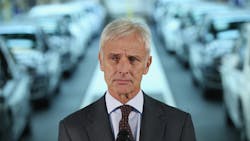German Consumers Want VW Vouchers as Compensation
BERLIN — Germany’s consumers association wants Volkswagen to offer vouchers as compensation to German customers affected by the massive pollution cheating scandal.
“The group must assume its responsibilities,” said Klaus Mueller, president of the Federation of the Associations of Protection for Consumers, in an interview with the Rheinische Post newspaper on Monday. “A voucher is the minimum that the company can give to compensate affected consumers.”
Volkswagen of America said each owner of cars with 2.0 liter diesel engines that violate U.S. rules on emissions of poisonous nitrogen oxide gases will receive a $500 prepaid Visa credit card and $500 in credits at VW dealerships to support their loyalty to the brand. In addition, owners will receive three years of free roadside assistance.
“We are working tirelessly to develop an approved remedy for affected vehicles,” Volkswagen Group of America president and CEO Michael Horn said in a statement. “In the meantime, we are providing this goodwill package as a first step towards regaining our customers’ trust.”
VW subsidiary Audi will offer a similar package to owners of Audi models with the same engines, the company said.
A spokesman added that the company is developing “an individual package for each market,” and that for Germany, consultations are ongoing with the authorities.
VW is engulfed in a massive pollution scandal that has so far centered on so-called defeat devices, sophisticated software fitted into diesel engines to skew the results of tests for nitrogen oxide emissions.
The carmaker has admitted to fitting 11 million diesel engines worldwide with the rogue software, triggering both regulatory and criminal investigations in a range of countries, including Germany and the United States.
But last Tuesday, the embattled auto giant said an internal probe had uncovered “inconsistencies” on carbon emissions as well, affecting not only diesel engines but gas engines, too.
VW put the number of vehicles affected so far by the carbon emissions issue at 800,000 — including 98,000 gas-engine cars — but the final figure could turn out much higher.
The company’s top management is meeting Monday on the new cheating revelations, which has sparked speculation about the role of VW’s former CEO Martin Winterkorn. The ex-boss had quit in September at the height of the pollution cheating storm and, according to press reports, targets on technical performance and costs set by Winterkorn had pushed employees to resort to fitting cheating devices in the vehicles.
Meanwhile, Volkswagen has said the carbon emissions cheating was unveiled by the group’s employees.
“The question of how we got there is the subject of investigation,” the group said.
Fitch Cuts VW's Rating to BBB+
In related news, Fitch ratings agency cut VW’s credit rating by two notches Monday, saying that the widening pollution cheating scandal has exposed weak corporate governance at the company.
“We believe that the emergence of a fraud of this magnitude, going either unnoticed or uncorrected by top management for so long is not consistent with a rating in the ‘A’ category,” Fitch said.
The agency said it had therefore downgraded Volkswagen to “BBB+” over the “corporate government, management and organizational issues highlighted by the ongoing emission test crisis.”
The latest revelations — that VW had also understated carbon dioxide emissions of 800,000 vehicles, including gas cars — give rise to “the possibility of further problems still to be uncovered,” said Fitch, as it put VW on negative watch.
In a protest Monday, environment group Greenpeace added a “C” and “2” on either side of the company’s circular logo at the entrance of a factory in Wolfsburg, forming “CO2,” and hung a banner bearing the slogan “The Problem” next to it.
As Volkswagen prepared to recall millions of cars to remove the defeat devices, Germany’s transport ministry said Monday that out of the 2.4 million affected cars in the country, around 540,000 would require hardware repairs.
Volkswagen had earlier said that the repair work required for the 11 million cars could range from a simple software tweak to a major engine overhaul.
Copyright Agence France-Presse, 2015
About the Author
Agence France-Presse
Copyright Agence France-Presse, 2002-2025. AFP text, photos, graphics and logos shall not be reproduced, published, broadcast, rewritten for broadcast or publication or redistributed directly or indirectly in any medium. AFP shall not be held liable for any delays, inaccuracies, errors or omissions in any AFP content, or for any actions taken in consequence.
